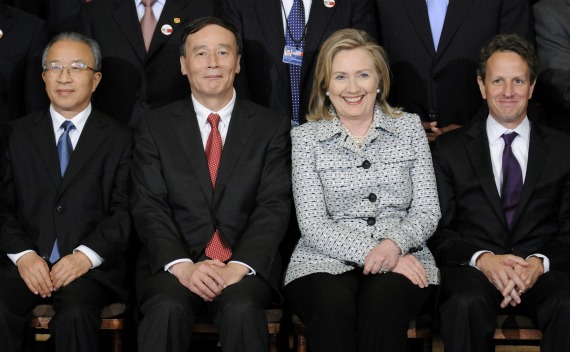The S&ED No-Holds Barred: China’s Deplorable Human Rights and the Simple American People
More on:

So, the title of my post is a bit misleading. The Strategic and Economic Dialogue (S&ED) was actually pretty much what I thought it was going to be, namely pretty tame stuff. Together, the U.S. and China identified a wide range of issues on which the two sides hope to cooperate. The range of issues, in fact, was breathtaking—or some might call it weird—everything from Sudan and North Korea to smart grid to the China garden project. I would guess that the China garden project will break ground before spring comes to North Korea.
The “no-holds barred” part of the S&ED came not at the S&ED itself, but rather courtesy of the U.S. media. First, there was a well-timed piece in the Atlantic by Jeffrey Goldberg, in which he interviewed Secretary of State Clinton. Although the bulk of the interview had nothing to do with China, Secretary Clinton’s remarks about China have gotten all the attention. Both Goldberg and fellow Atlantic writer James Fallows appear rather shocked at the Secretary’s comment that China’s human rights record is “deplorable” and that in holding off reform, the Chinese are on “a fool’s errand,” by “trying to stop history.” Goldberg likens Clinton’s remarks to those of the Cold War Reagan era. Fallows, in turn, implies that Clinton is reinforcing Beijing’s belief that the United States is trying to contain China and, in the process, acting outside the realm of traditional U.S. public diplomacy.
I have to say that I think the Atlantic duo is off-base here. Secretary Clinton is simply stating one fact: China’s human rights record is deplorable; along with the short-hand version of one theory: political modernization. You can disagree with her theory, but there is nothing wrong with her stating it. She is not saying that we should contain China. She is merely stating that China’s leaders, too, are confronting bottom-up pressures for reform and might want to address the challenge in a way that will prevent the kind of turmoil the Middle East has experienced. Cracking down on dissent has generally proved to be a “short-term” solution (taking into account that short-term may be measured in decades). From my perspective, it was friendly advice, along the lines of President Hu Jintao and Premier Wen Jiabao suggesting that U.S. fiscal policy is out of whack.
The real attention-getter, however, was not Secretary Clinton but Chinese Vice –premier Wang Qishan. Appearing with Secretary Geithner on Charlie Rose, Wang said, “It is not easy to really know China because China is an ancient civilization and we are of the Oriental culture. The United States is the world’s number one superpower, and the American people, they’re very simple people.” Various interpretations of simple have emerged—innocent, stupid, not complicated. Whatever the case, Wang seems to be implying that we are congenitally incapable of understanding China.
My feeling is that the U.S. understands China about as well as China understands the United States, which is to say, not well enough. Beyond that, the real question in my mind is whether better understanding will yield better relations. While we puzzle that one out, I want to cast my vote for the refreshing candor from both Secretary Clinton and Vice-premier Wang. It helps to know what the person sitting across from you really thinks, and just because the veil has been lifted doesn’t mean the gloves have to come off.
More on:
 Online Store
Online Store